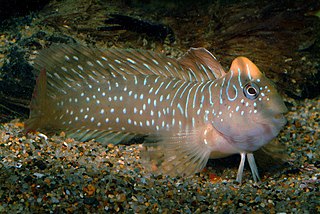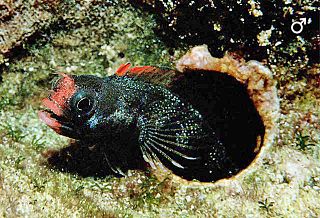
Combtooth blennies are blenniiformids; percomorph marine fish of the family Blenniidae, part of the order Blenniiformes. They are the largest family of blennies with around 401 known species in 58 generas. Combtooth blennies are found in tropical and subtropical waters in the Atlantic, Pacific and Indian Oceans; some species are also found in brackish and even freshwater environments.

Labrisomids are small blennioids (blennies), percomorph marine fish belonging to the family Labrisomidae. Found mostly in the tropical Atlantic and Pacific Ocean, the family contains about 110 species in 15 genera.

Blenny is a common name for a type of fish. The term is ambiguous, having been applied to several families of percomorph marine, brackish, and some freshwater fish sharing similar morphology and behaviour. Six families are considered "true blennies", all grouped together under the order Blenniiformes; its members are referred to as blenniiformids. About 151 genera and nearly 900 species have been described within the order. The order was formerly classified as a suborder of the Perciformes but the 5th Edition of Fishes of the World divided the Perciformes into a number of new orders and the Blenniiformes were placed in the percomorph clade Ovalentaria alongside the such taxa as Cichliformes, Mugiliformes and Gobiesociformes.

Salaria is a genus of fish in the family Blenniidae. It contains both freshwater and marine species which are found around the Mediterranean Sea and the eastern Atlantic Ocean. One species, the peacock blenny, has colonised the northern Red Sea through the Suez Canal, a process knowns as anti-Lesspesian migration.

Salarias is a genus of combtooth blennies found in the Indian and Pacific oceans.

Ecsenius is a large genus of fish in the family Blenniidae.

Acanthemblemaria is a genus of chaenopsid blennies native to the Atlantic and Pacific Oceans.

Blenniella is a genus of combtooth blennies found in the Pacific and Indian Oceans.

Cirripectes is a large genus of combtooth blennies found throughout the Pacific and Indian oceans.

Hypleurochilus is a genus of combtooth blennies found throughout the Atlantic Ocean.

Hypsoblennius is a genus of combtooth blennies found in the Pacific and Atlantic Oceans.

Meiacanthus is a genus of combtooth blennies found in the western Pacific and Indian oceans. Many species in this genus make their way into the aquarium trade and several are venomous. The genus name Meiacanthus is derived from the Greek meion meaning "less" and akantha meaning "thorn" and refers to most species having relatively few dorsal fin spines.
Laiphognathus longispinis, the crown spotty blenny, is a species of combtooth blenny found in the northwest Pacific ocean. It can reach a maximum length of 5.1 centimetres (2.0 in) SL.
Laiphognathus multimaculatus, the spotty blenny, is a species of combtooth blenny found in the western Pacific and Indian Oceans. It can reach a maximum length of 4 centimetres (1.6 in) SL, and is a commercial aquarium fish.

Parablennius is a diverse genus of combtooth blennies found in the Atlantic, western Pacific, and Indian oceans.
Emblemaria is a genus of chaenopsid blennies found throughout the Pacific and Atlantic oceans.

Emblemariopsis is a genus of flagblennies found throughout the Atlantic ocean.

Paraclinus is a genus of labrisomid blennies native to eastern Pacific Ocean and the western Atlantic Ocean.

Starksia is a genus of labrisomid blennies native to the western Atlantic Ocean and the eastern Pacific Ocean. Their typical length is 2 cm (0.79 in) SL. The generic name honours the American ichthyologist Edwin Chapin Starks (1867-1932) of Stanford University for his work on Pacific coastal fishes. As a genus Starksia is distinguished from other labrisomids by their scaled bodies, two obvious soft rays in the pelvic fin and the male's have an intromittent organ which is near to or attached to the first spine of their anal fins, which is also somewhat separated from the fin.

Blenniinae is one of two subfamilies in the combtooth blenny family Blenniidae, it is the smallest of the two subfamilies in the Blennidae with 16 genera and 95 species.
















